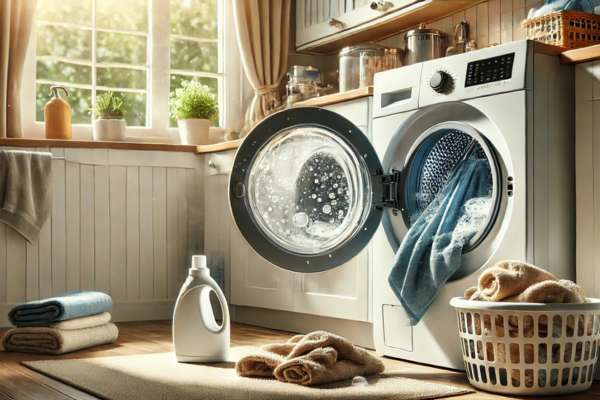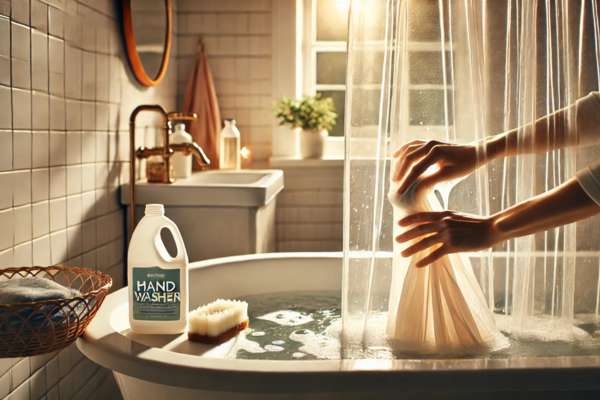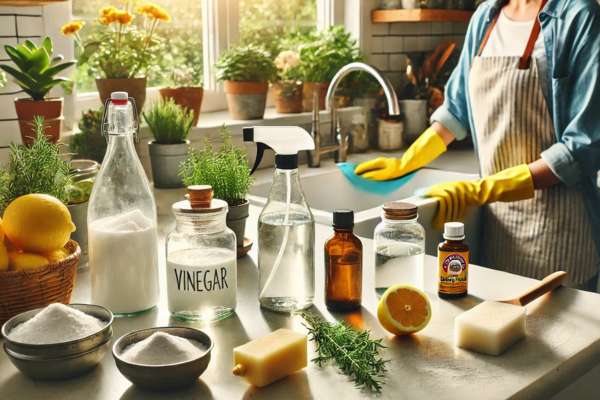Cleaning plastic shower curtains can seem like a small project, however it makes a big difference in retaining your bathroom fresh and hygienic. Over time, soap scum, mildew, and stains build up on plastic curtains, making them look dull and worn. Knowing how to clean plastic shower curtains effectively can save you from frequent replacements and keep your bathroom looking its best. From quick rinse techniques to thorough washes with household items, cleaning plastic shower curtains is simple when done right. This guide will cover effective techniques, vital additives, and clever suggestions to help you repair your curtain’s look and keep it searching easy and welcoming. Let’s dive into truthful methods to easily, keep, and amplify the existence of your plastic bath curtain.
Understanding Plastic Shower Curtains

Plastic shower curtains, often made from materials like vinyl or polyethylene, are popular for their affordability and durability. Unlike fabric curtains, plastic ones are water-resistant, making them more resilient against constant moisture exposure. However, this resistance also means they’re susceptible to surface build-up from soap residue and hard water. Recognizing the material properties of your plastic curtain is the first step in understanding how to clean it effectively without compromising its structure or design.
Choosing The Right Cleaning Method For Plastic Shower Curtains

The best cleaning method for your shower curtain depends on the level of dirt and type of plastic. If your curtain has only minor soap stains, a quick wipe-down might be enough. For heavier grime or mildew, a more intensive cleaning—such as a machine wash or hand wash with specific cleaning agents—is necessary. Choose a method that is safe for the material and does not require harsh chemicals, which can weaken the plastics over time.
Gathering Essential Cleaning Supplies

Having the right supplies can make the cleaning process smoother and more effective. Essential items include:
– Mild detergent or dish soap for gentle cleaning.
– Baking soda for mild abrasive action.
– White vinegar, known for its antibacterial and odor-neutralizing properties.
– A soft sponge or cloth for wiping without scratching.
– A plastic bucket (if you’ll be soaking the curtain) and a few old towels.
Each of these items will play a role in the specific cleaning methods you’ll use, ensuring your curtain gets cleaned thoroughly without damage.
Preparing Your Shower Curtain For Cleaning

Before beginning, carefully remove the curtain from its rings. This step allows you to clean the curtain more thoroughly, without any folds or creases hiding grime. If the curtain has accumulated dust or particles, a quick rinse under the shower or in the bathtub can help remove surface dirt, making the subsequent cleaning steps more effective.
Washing Your Plastic Shower Curtain In The Washing Machine

For plastic curtains that are machine-washable, this method is both quick and effective. Place the curtain in the washing machine along with a few old towels; the towels act as scrubbers, gently agitating the curtain without causing tears. Add a small amount of mild detergent and set the machine to a gentle cycle with cold or warm water. Avoid using hot water, as it can warp or damage the plastics. Once the cycle is complete, inspect the curtain to ensure all soap scum and stains have been removed.
Hand-Washing Method For Delicate Plastic Curtains

Some plastic curtains, particularly thinner or decorative ones, may not withstand the machine wash. For these, a hand-wash method is ideal. Fill a tub or large basin with warm water, add a few drops of mild detergent, and a sprinkle of baking soda. Using a soft cloth or sponge, scrub the curtains, paying extra attention to any areas with visible stains. Rinse thoroughly with cold water to remove all soap residue before drying.
Cleaning With Natural Ingredients

Natural ingredients like vinegar and baking soda are excellent for cleaning clean plastic shower curtains without the use of harsh chemicals. For a natural wash, soak the curtain in a mixture of one part white vinegar to four parts warm water. Let it sit for about 20 minutes. For any stubborn stains, sprinkle baking soda directly onto a damp cloth or sponge and scrub gently. The vinegar disinfects and deodorizes, while the baking soda lifts grime effectively.
Drying And Rehanging Your Plastic Shower Curtain

Once the curtain is clean, it’s essential to dry it properly to prevent any mildew from forming. Air drying is usually the best option; hang the curtains back on its rod, fully extended, so it dries evenly. Avoid using a dryer, as the heat can cause the plastics to melt or warp. If possible, leave a window open or use a fan to speed up the drying process.
Preventative Care For Longer-Lasting Shower Curtains

Preventative care goes a long way in reducing the need for frequent deep cleans. After each shower, pull the curtain closed to allow it to air dry more quickly. This simple step reduces the chance of mildew forming in folds. Additionally, a quick rinse with warm water and a squeegee can help keep soap scum from accumulating on the curtain surface.
Monthly Maintenance Routine For Plastic Shower Curtains
A monthly cleaning routine can help keep your plastic shower curtain in top shape. Once a month, remove the curtain, rinse it with warm water, and wipe it down with a diluted vinegar solution. Regular maintenance ensures that grime, soap scum, and mildew never get the chance to build up significantly, keeping your curtains looking clean and fresh without the need for intensive scrubbing.
Storing And Reusing Plastic Shower Curtains
If you plan to store your plastic shower curtain between uses or while redecorating, make sure it is completely dry. Fold it neatly to avoid creases that could lead to cracks over time. Store it in a dry, cool place to prevent moisture from accumulating. Proper storage extends the curtain’s life and allows for reuse without signs of mildew or odor.
Tips For Cleaning Shower Curtains With Patterns Or Prints
If your plastic shower curtain features printed patterns or designs, cleaning requires a gentler touch to preserve the visuals. Avoid abrasive cleaners that could fade or scratch the designs. Instead, opt for a mild detergent or a diluted vinegar solution and use a soft cloth for wiping. When using a washing machine, make sure to wash on a gentle cycle with cold water and avoid any harsh additives.
Common Mistakes To Avoid When Cleaning Plastic Shower Curtains
1. Using Bleach on Colored Curtains: Bleach can be overly harsh on plastics and may discolor colored curtains. Opt for vinegar or mild detergents instead.
2. Using Hot Water: High temperatures can warp plastics curtains. Stick to cold or lukewarm water for best results.
3. Skipping Rinsing: Leftover cleaning agents can leave streaks and contribute to faster grime build-up. Always rinse thoroughly.
4. Drying in Direct Sunlight: Direct sunlight can cause some plastics materials to become brittle over time. Instead, air-dry in a shaded, ventilated space.
Frequently Asked Questions
1. How Often Should You Clean a Plastics Shower Curtain?
It’s recommended to clean a plastic shower curtains every month or at least once every three months, depending on usage. Regular cleaning prevents the buildup of soap scum and mildew.
2. Can You Use Vinegar on Plastic Shower Curtains?
Yes, white vinegar is excellent for cleaning plastic shower curtains. Its antibacterial properties help eliminate mold and odors without damaging the plastic.
Final Thoughts
Maintaining a clean plastic shower curtain is essential for a fresh and hygienic bathroom. With simple cleaning methods, such as machine washing, hand-washing, or using natural ingredients like vinegar and baking soda, you can easily remove soap scum, mildew, and odors. Regular upkeep prevents grime buildup, preserving the curtain’s appearance and durability. By following these straightforward steps, “how to clean plastic shower curtains” becomes a quick and manageable task, ensuring your bathroom stays inviting. With steady upkeep and the right techniques, you’ll preserve your plastics bathe curtains in first-rate circumstances, improving both its longevity and your toilet’s average cleanliness.

